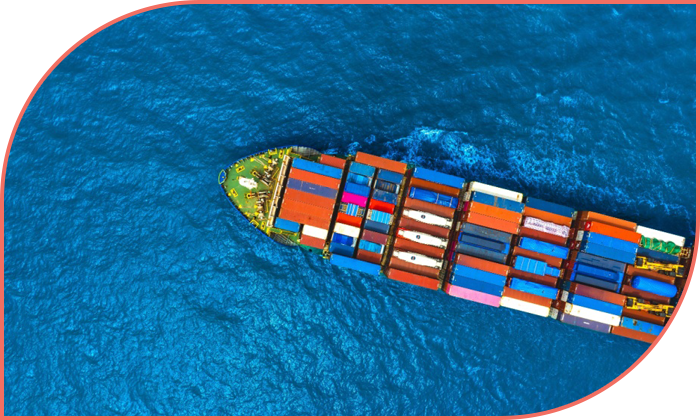Cost, Insurance and Freight (CIF)
What is the CIF meaning in shipping?
CIF, or Cost, Insurance and Freight, is a commonly Incoterm in international shipping.
Under CIF terms, the seller is responsible for arranging and paying for the transportation of goods to a designated port of destination, as well as securing insurance coverage against the risk of loss or damage during transit.
This Incoterm follows the same procedure as Cost and Freight, however, the seller must also provide insurance for the goods in case they are lost or damaged during transportation.
The CIF freight meaning stipulates that once the items arrive at the buyer's port of destination, the buyer is responsible for paying for and handling the costs of unloading and delivering the shipment to its destination.
What are the buyer's responsibilities in CIF?
The buyer is in charge of paying the expenses related to importing and shipping the goods once they have reached the buyer's destination port with the CIF Incoterm. Among these expenses are the following:
- Product unloading at the port terminal
- Moving the goods from the terminal to the delivery location
- Costs for customs duties and other related costs when importing products
- Fees associated with loading, unloading, and delivering the merchandise to its destination
What are the seller’s responsibilities in CIF?
The CIF freight meaning states that the following are the seller’s obligations:
- Purchasing export licenses for the item
- Conducting product inspections
- Any costs or expenses related to loading and transporting the goods to the port of the seller
- The expense of packaging the cargo for export
Fees for duty, taxes, and customs clearance (for exporting)
- The price of transporting the goods from the seller's port to the buyer's destination port by water or sea
- The price of shipping insurance up to the buyer's destination port
- Covering the price of any deterioration or damage to the products
- In addition to providing confirmation of delivery and loading, the seller is required to deliver the products to the ship within the predetermined time range.
Find The Lowest Freight Rates Today
Compare shipping quotes from trusted providers. Get the best deals for ocean or air freight.
Is CIF suitable for all types of goods?
No, CIF is not an ideal Incoterm agreement for containerised goods. Since the risk transfers to the buyer once the goods are loaded onto the vessel, it can be challenging to determine when damage occurred to the goods inside a container. The CIF delivery term is more appropriate for bulk and breakbulk cargo.
When to use Cost, Insurance and Freight agreement?
- CIF agreements should be used exclusively for sea and waterway shipments.
- For newcomers to importing, CIF Incoterm can be beneficial as it helps them grasp the importing process before delving into the complexities of exporting.
- If the buyer prefers the seller to arrange and manage the insurance coverage for the goods during transit, a CIF agreement is appropriate.
- This ensures the goods are insured up to the point of delivery at the destination port.
- A CIF agreement simplifies the logistics for the buyer, as the seller handles the main transportation and insurance. This can be particularly advantageous for buyers who are less experienced in international shipping.
- CIF is suitable for port-to-port shipping scenarios where the goods will be transported directly from the seller's port to the buyer's port without the need for further handling or transportation.

What are the benefits of CIF?

Simplified logistics for buyers
CIF Incoterm helps to simplify the logistics for buyers, as the seller takes responsibility for arranging and paying for the main transportation and insurance up to the destination port. This reduces the buyer’s involvement in complex shipping arrangements.
Seller-arranged insurance
Under CIF terms, the seller arranges and pays for insurance coverage.
Convenience for less experienced buyers
The CIF delivery term is more convenient for buyers with less experience in international shopping. It ensures they don’t have to navigate the complexities of arranging freight and insurance.
Competitive advantage for sellers
Offering Cost, Insurance and Freight terms can make a seller’s offer more attractive to potential buyers, as it demonstrates the seller’s willingness to handle logistics and insurance.
What are the drawbacks of CIF?
Buyer responsibility during transit
Once the items are on board the conveyance vessel, all risk is assumed by the buyer. It is their responsibility, not the seller's, to make any necessary corrections or cover any losses that arise during the shipping process.
Higher costs
The CIF freight meaning often results in higher overall costs for the buyer. The seller includes the cost of transportation and insurance in the price, which can be more expensive than if the buyer arranged these services independently.
Limited control over shipping
Buyers have less control over the choice of shipping carriers and routes, as these decisions are made by the seller. The CIF delivery term can lead to less favourable shipping terms and potentially longer transit times for the buyer.
Insurance coverage limitations
The insurance coverage arranged by the seller in a CIF Incoterm might not fully meet the buyer's specific needs. The coverage is typically the minimum required, which might not be sufficient for high-value or sensitive goods.


Complexity in claims handling
In the event of loss or damage, buyers might face difficulties in handling insurance claims. The insurance policy is arranged by the seller, which can complicate the claims process for the buyer.
Less flexibility
The CIF incoterm can provide less flexibility in terms of negotiating freight and insurance terms. Buyers who prefer to tailor these aspects to their specific requirements may find Cost, Insurance and Freight restrictive.
Inconsistent quality of Service
The quality of shipping and insurance services can vary depending on the seller’s arrangements. Buyers might end up with lower-quality services than if they had selected their own providers.
Documentation and customs issues
Buyers must handle customs clearance and any issues that arise at the destination port, which can be complex without prior experience of Cost, Insurance and Freight.
Compare Freight Shipping Rates in Seconds
Get instant quotes from leading ocean and air freight providers. Find the best rates for your shipping needs in one place.